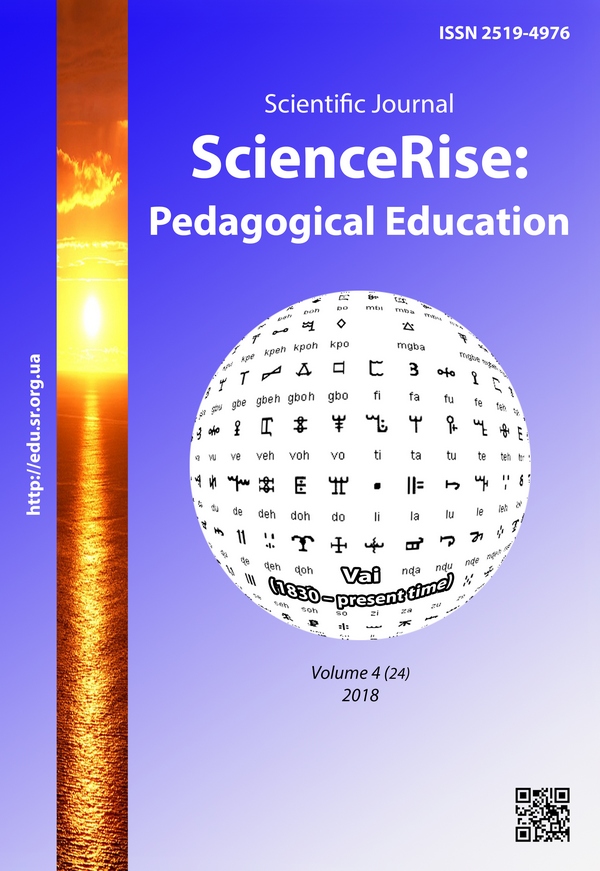The formation of value orientations of students in the university cultural creative environment
DOI:
https://doi.org/10.15587/2519-4984.2018.131950Keywords:
culture-creative environment, valued orientations, axiological approach. healthforming values, social and educational valuesAbstract
The article analyzes the system of value orientations of students in the cultural-educational environment of the university, which provides the standards of cultural assessments of the individual, defines the hierarchy of its life goals and the choice of methods for their achievement.
The system of value orientations of the cultural environment of the higher educational establishment includes the values associated with the understanding of the personality of his role in the educational environment (social significance of educational activity, its prestige, recognition of the profession by the immediate environment, etc.); – values that meet the need for communication and broaden its range (communication with fellow students, colleagues, exchange of spiritual values, etc.); – values oriented towards the self-development of creative individuality and self-realization (improvement of professional and creative abilities, involvement in world culture, occupation of a favorite subject, creative, varied character of learning, admission to the future profession, constant self-improvement, etc.); – values that satisfy pragmatic needs (obtaining guaranteed work, career growth, etc.).
The essence of the axiological approach to the formation of value orientations as the basis of humane relations between teachers and students is determined; awareness of personal value orientation is determined; correlation of value orientation with the whole system of values; the transfer of meaningful value orientation to different life situations, independent search for new personally attractive values.
Implementation of the axiological approach to the formation of value orientations of students in the cultural environment of the higher educational establishment allows: orient students to the formation of social values and social success; to evaluate the activity and behavior of subjects of the educational space, as well as the behavior of others in the cultural-educational environment of the institution of higher education; develop personal skills and ability, depending on the circumstances, the situation, to make adjustments to their own activities and behavior (social flexibility); to form the existence of solid social ideals, social beliefs, values and value orientations of students; direct the student's personality to the choice of norms and values in situations of moral choice
References
- Ranatsevich, E. S. (2005). Pedagogika: Bolshaya sovremennaya entsiklopediya. Minsk, 720.
- Bakradze, K. S. (1973). Izbrannyie filosofskie trudyi. Ocherki po istorii noveyshey sovremennoy burzhuaznoy filosofii. Tbilisi: Izdatelstvo Tbilisskogo universiteta, 389.
- Rikket, G. (1995). Nauki o prirode i culture. Kulturologiya. XX vek. Antologiya. Moscow, 70.
- Kluckhohn, С. (1962). Values and Value-Orientations in the Theory of Action. Toward a general theory of action. Massachusets, 388–433. doi: 10.4159/harvard.9780674863507.c8
- Pelekh, Yu. V. (2009). Aksiopedahohika: prostir dlia innovatyky i sensotvorchosti. Osvita, 46-47, 6.
- Kremin, V. H. (Ed.) (2008). Sotsializatsiia. Entsyklopediia osvity. Kyiv: Yurinkom Inter, 834–835.
- Lavrychenko, N. M. (2000). Pedahohika sotsializatsii: yevropeiski abrysy. Kyiv: ViRA INSAIT, 444.
- Kryilova, N. B. (1990). Formirovanie kulturyi buduschego spetsialista. Moscow: Vyisshaya shkola, 142.
- Rokich, M. (1973). Priroda chelovecheskih tsennostei. Moscow; New York, 276.
- Slastenin, V. A., Isaiev, I. F., Shyianov, Ye. M.; Slastenin, V. A. (Ed.) (2006). Pedahohika. Moscow: Vydavnychyi tsentr «Akademiia», 576.
Downloads
Published
How to Cite
Issue
Section
License
Copyright (c) 2018 Larissa Ordina, Alexandr Yarmola

This work is licensed under a Creative Commons Attribution 4.0 International License.
Our journal abides by the Creative Commons CC BY copyright rights and permissions for open access journals.
Authors, who are published in this journal, agree to the following conditions:
1. The authors reserve the right to authorship of the work and pass the first publication right of this work to the journal under the terms of a Creative Commons CC BY, which allows others to freely distribute the published research with the obligatory reference to the authors of the original work and the first publication of the work in this journal.
2. The authors have the right to conclude separate supplement agreements that relate to non-exclusive work distribution in the form in which it has been published by the journal (for example, to upload the work to the online storage of the journal or publish it as part of a monograph), provided that the reference to the first publication of the work in this journal is included.







